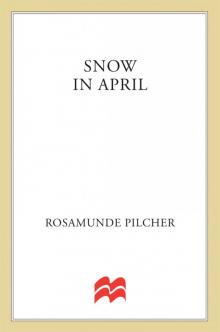- Home
- Rosamunde Pilcher
The Day of the Storm Page 7
The Day of the Storm Read online
Page 7
“What sort of work?”
“Well, I restore antique furniture. And don’t gape in that unattractive fashion, it does nothing for you.”
“Restore antique furniture? You must be joking.”
“I’m not. And Grenville Bayliss has a houseful of old and very valuable stuff. In his day he made a lot of money, and he invested most of it in antiques. Now, some of the things are in a shocking state of repair, not that they haven’t been polished to within an inch of their lives, but ten years ago he put in central heating and that wrecks old furniture. Drawers shrink and veneers curl and crack, and legs fall off chairs. Incidentally—” he added, diverted by the memory—“it was I who mended your cherrywood chair.”
“But how long have you been doing this?”
“Let’s see, I left school when I was seventeen, and I’m twenty-four now, so that makes it about seven years.”
“But you had to learn…”
“Oh, sure. I did joinery and carpentry first, four years of it at a trade school in London, and then when I’d got that under my belt, I apprenticed myself for another couple of years to an old cabinet-maker down in Sussex. I lived with him and his wife, did all the dirty jobs in the workshop, learned everything I know.”
I did a few sums. “That’s only six years. You said seven.”
He laughed. “I took a year off in the middle to travel. My parents said I was becoming parochial. My father has a cousin who runs a cattle ranch up in the Rockies, south-west Colorado. I worked as a ranch hand nine months or more.” He frowned. “What are you grinning about?”
I told him. “That first time I saw you, in the shop … you looked like a ranch hand … you looked real. And somehow it annoyed me that you weren’t.”
He smiled. “And you know what you looked like?”
I cooled off. “No.”
“The head girl of a nicely run orphanage. And that annoyed me.”
A small clash of swords, and once more we were on opposite sides of the fence.
I eyed him with dislike as he cheerfully finished his soup; the waitress came to take away the empty plates, and to set down a carafe of red wine. I had not heard Joss ordering the wine, but now I watched him pour two full glasses and I saw the long spade-tipped fingers; I liked the idea of them working with wood and old and beautiful things, shaping and measuring and oiling and coaxing into shape. I picked up the glass of wine and against the light it glowed red as a ruby. I said, “Is that all you’re doing in Porthkerris? Restoring Grenville Bayliss’s furniture?”
“Good God, no. I’m opening a shop. I managed to rent these premises down on the harbour six months or so ago. I’ve been here, off and on, ever since. Now, I’m trying to get it into some sort of order before Easter, or Whitsun, or whenever the summer business really starts.”
“Is it an antique shop?”
“No, modern, furniture, glass, textiles. But antique restoring goes on in the background. I mean I have a workroom. I also have a small pad on the top floor which is where I now live, which is why you were able to take over my room at Mrs Kernow’s. One day when you’ve decided that I’m trustworthy you can climb the rickety stairs and I’ll show it to you.”
I ignored this fresh little sally.
“If you work down here, what were you doing in that shop in London?”
“Tristram’s? I told you, he’s a friend; I drop in and see him whenever I’m up in town.”
I frowned. There were so many coincidences. Our lives seemed to be tied up in them, like a parcel well-knotted with ends of string. I watched him finish his wine and once more was visited with the unease which I had known earlier in the evening. I knew I should ask him a thousand questions, but before I could think of one the waitress arrived at our table once more, bearing steaks and vegetables and fried potatoes and dishes of salad. I drank some wine and watched Joss, and when the waitress had gone I said, “What does Eliot Bayliss do?”
“Eliot? He runs a garage up at High Cross, specializes in highly-powered second-hand cars, Mercedes, Alfa Romeos. If you’ve got the right sort of cheque book he can supply you with practically anything.”
“You don’t like him, do you?”
“I never said I didn’t like him.”
“But you don’t.”
“Perhaps it would be nearer the mark to say he doesn’t like me.”
“Why?”
He looked up, his eyes dancing with amusement. “I haven’t any idea. Now why don’t you eat up your steak before it gets cold.”
* * *
He drove me home. It was still raining and I was, all at once, deathly tired. Outside Mrs Kernow’s door Joss stopped the car, but left the engine running. I thanked him and said good night and began to open the door, but before I could do so he had reached across and stopped me. I turned to look at him.
He said, “Tomorrow. Are you going to Boscarva?”
“Yes.”
“I’ll take you.”
“I can go alone.”
“You don’t know where the house is, and it’s a long climb up the hill. I’ll pick you up in the car. About eleven?”
Arguing with him was like arguing with a steamroller. And I was exhausted. I said, “All right.”
He opened the door for me and pushed it open.
“Good night, Rebecca.”
“Good night.”
“I’ll see you in the morning.”
5
The wind did not drop during that night. But when I woke, the little window of my room at Mrs Kernow’s gave me sight of a square of pale blue traversed by ballooning white clouds travelling at some speed. It was very cold, but bravely I got up and dressed and went downstairs in search of Mrs Kernow. I found her outside in the little yard at the back of the house, pegging out her washing on a line. At first, battling with flailing sheets and towels, she didn’t see me, but when I appeared between a shirt and a modest lock-knit petticoat she gave a great start of surprise. Her own astonishment amused her, and she shook with shrill laughter, as though the two of us were a double act on the halls.
“You gave me some shock. I thought you were still asleep! Comfortable were you? That dratted wind’s still around the place, but the rain’s stopped, thank heaven. Want your breakfast do you?”
“A cup of tea, perhaps.”
I helped her peg out the rest of the washing and then she picked up her empty basket and led the way back indoors. I sat at the kitchen table and she boiled a kettle and began to fry bacon.
“Have a good supper last night did you? Go to The Anchor? Tommy Williams keeps a good place there, always packed, winter and summer. I heard Joss bring you home. He’s a lovely boy. I missed him when he moved out. Still, I go down sometimes to his new place, clean it up a bit for him, bring his washing home and do it here. Sad, a young man like that on his own. All wrong somehow, not having someone to take care of him.”
“I should think Joss could take care of himself.”
“It’s not right a man doing woman’s work.” Mrs Kernow obviously did not believe in Women’s Lib. “Besides, he’s busy enough working for Mr Bayliss.”
“Do you know Mr Bayliss?”
“Everyone knows he. Lived here nearly fifty years now. One of the old ones, he is. And some lovely painter he was before he took ill. Used to have an exhibition every year, and all sorts used to come down from London, famous people, everybody. ’Course, lately we don’t see so much of him. He can’t walk up and down the hill like he used to, and it’s a bit of a business Pettifer getting that great car down these narrow lanes. Besides, in the summer, you can’t move for traffic and visitors. The place is teeming with them. Sometimes you’d think half the population of the country is jammed into this little town.”
She flipped the bacon on to a warm plate and set it in front of me. “There now, eat that up before it gets cold.”
I said, “Mrs Kernow, Mr Bayliss is my grandfather.”
She stared at me, frowning. “Your grandfather?” The
n, “Whose child are you?”
“Lisa’s.”
“Lisa’s child.” She reached for a chair and slowly sat down upon it. I saw that I had shocked her. “Does Joss know?”
It seemed irrelevant. “Yes, I told him last night.”
“She was a lovely little girl.” She stared into my face. “I can see her in you … except that she was so dark and you’re fair. We missed her when she went, and never came back. Where is she now?”
I told her. When I had finished she said, “And Mr Bayliss doesn’t know you’re here?”
“No.”
“You must go now. Right away. Oh, I wish I could be there to see the old man’s face. He worshipped your mother…”
A tear gleamed. Quickly, before we were both awash with sentiment, I said, “I don’t know how to get there.”
Trying to tell me, she confused the two of us so much that finally she found an old envelope and the stub of a pencil and drew a rough map. Watching her I remembered Joss’s promise to come at eleven o’clock and take me to Boscarva in his ramshackle van, but all at once it seemed a much better idea to go at once, on my own. Besides, last night I had been altogether too meek and compliant. It would do Joss’s boundless ego no harm to arrive here and find me already gone. The thought of this happening cheered me considerably and I went upstairs to fetch my coat.
Outside I was instantly buffeted by the wind which tunnelled down the narrow street like the draught in a chimney. It was a cold wind, smelling of the sea, but when the sun burst out from behind the racing clouds the brightness was dazzling, full of glare, and overhead gulls screamed and floated, their wings white sails against the blue of the sky.
I walked and soon I was climbing. Up narrow, cobbled streets, between haphazard lines of houses. Up flights of steps, and leaning alleys. The higher I went the stronger became the wind. As I climbed the town dropped below me, and the ocean revealed itself, dark blue, streaked with jade and purple and flecked with white horses. It spread to the horizon where the sky took over, and below me the town and the harbour shrank to toy-size, to insignificance.
I stood looking at it, catching my breath, and all at once a funny thing happened. For this new place was not new to me at all, but totally familiar. I felt at home, as though I had returned to somewhere I had known all my life. And though I had scarcely thought of my mother since making the decision to come to Porthkerris, she was suddenly beside me, climbing the steep streets, long-legged, breathless, and warm with exertion as I was.
I was comforted by this sense of déjà-vu. It made me feel less lonely and much more brave. I went on and was glad I had not waited for Joss. His presence was disturbing, but I could not for the life of me decide why. He had, after all, been quite open with me, answering questions, giving perfectly believable reasons for his every action.
It was obvious that there was no love lost between himself and Eliot Bayliss, but I could easily understand this. The two young men would have nothing in common. Eliot, albeit unwillingly, was living at Boscarva. He was a Bayliss and the house was, for the time being, his home. On the other hand Joss’s occupation in the house would give him the freedom to come and go in his own time. Be found, unexpectedly, at odd hours of the day, perhaps when his presence was neither convenient nor welcome. I imagined him on easy terms with everybody, sometimes getting in the way, and worst of all, blithely unaware of the trouble he was causing. A man like Eliot would resent this and Joss, in return, would react to his resentment.
Busy with these thoughts and the exertion of climbing, I did not observe my surroundings, but now the road levelled off beneath my feet, and I stopped to look around and take my bearings. I was on top of the hill, that was for sure. Behind and below me lay the town; ahead stretched the rugged coastline, curving away into the distance. It bordered a green country, patchworked with small farms and miniature fields, traversed by deep valleys, thick with hawthorn and stunted elm, where narrow streams channelled their way down to the sea.
I looked about me. This too was country. Or a year ago it had been. But since then a farm, perhaps, had been bought out, the bulldozers brought in, old hedges demolished, the rich earth torn up and flattened, and a new housing estate was in the process of being erected. All was raw, stark and hideous. Cement mixers churned, a lorry ground through a sea of mud, there were piles of brick and concrete, and in front of it all, like a proud banner, a hoarding which announced the man responsible for this carnage.
ERNEST PADLOW
DESIRABLE DETACHED HOUSES
FOR SALE
Apply Sea Lane, Porthkerris
Telephone Porthkerris 873
The houses were certainly detached, but only just. Scarcely three feet lay between them, and one window stared straight into another.
My heart mourned for the lost fields and the lost opportunities. As I stood there, mentally re-designing the entire project, a car came up the hill behind me, and drew to a halt in front of the hoarding. It was an old Jaguar, navy blue, and the man who stepped out of it, shutting the door behind him with a resounding thump, wore a workman’s donkey jacket and carried a clip board and a lot of papers which fluttered in the wind. He turned and saw me, hesitated for only a second and then walked towards me, trying to flatten his hair down over his bald head.
“Morning.” His smile was familiar as though we were old friends.
“Good morning.”
I had seen him before. Last night. At The Anchor. Talking to Eliot Bayliss.
He glanced up at the hoarding.
“Thinking of buying a house for yourself?”
“No.”
“You should. Get a good view up here.”
I frowned. “I don’t want a house.”
“Be a good investment.”
“Are you the foreman?”
“No.” He glanced, with some pride, up at the hoarding which reared above us. “I’m Ernest Padlow.”
“I see.”
“Lovely site this…” He looked around at the devastation with some satisfaction. “Lot of people after this site, but the old girl who owned the land was a widow, and I managed to charm her into letting me have it.”
I was surprised. As he spoke he reached for and lit himself a cigarette; he did not offer me one, his fingers were stained with nicotine and he seemed to me the most uncharming man I had ever met.
He turned his attention back to me. “Haven’t seen you around, have I?”
“No.”
“Visiting?”
“Yes, perhaps.”
“It’s better out of season. Not so crowded.”
I said, “I’m looking for Boscarva.”
Caught unawares, the bonhomie slid from his manner. His eyes were sharp as pebbles in his florid face. “Boscarva? You mean old Bayliss’s place?”
“Yes.”
His expression became wily. “Looking for Eliot?”
“No.”
He waited for me to enlarge on this. When I didn’t he tried to make a joke of it. “Well, I always say, least said, soonest mended. You want Boscarva, you go down that little lane. About half a mile. You’ll see the house down towards the sea. It’s got a slate roof, a big garden round it. You can’t miss it.”
“Thank you.” I smiled politely. “Goodbye.”
I turned and began to walk, feeling his eyes on my back. Then he spoke once more and I turned back. He was smiling, all friends again.
“You want a house, make up your mind quickly. They’re selling like hot cakes.”
“Yes, I’m sure. But I don’t want one. Thank you.”
The lane led downhill towards the great blue bowl of the sea, and now I was truly in the country, in a farmland of fields grazed by sweet-faced Guernseys. Wild violets and primroses grew in the grassy hedges, and the sun came out and turned the rich grass to emerald. Presently, I came around a corner and saw the white gates, set between low drystone walls; a driveway curved down, out of sight, and there were high hedges of escallonia and elm trees, t
ortured to unnatural shapes by the relentless winds.
I could not see the house. I stood at the open gates and looked down the drive, my courage seeping away like bathwater after the plug has been pulled out. I could not think what I was meant to do, nor what I was going to say once I had done it.
My mind was, unexpectedly and mercifully, made up for me. Down by the house, out of sight, I heard a car start up and come at some speed up the drive towards me. As it approached, a low-slung open sports car of some age and style, I stood aside to let it flash past between the gate posts and up the hill in the direction from which I had come, but still there was time to see the driver and the great red setter sitting up on the back seat, with the deliriously joyful expression of any dog being taken for a ride in an open car.
I thought that I had not been noticed but I was wrong. A moment later the car stopped with a screech of brakes and a shower of small stones flung from the back wheels. Then it went into reverse, and returned, with scarcely less speed back to the spot where I stood. It stopped, the engine was killed, and Eliot Bayliss, leaning an arm on the driving wheel, surveyed me across the empty passenger seat. He was bare-headed and wore a sheepskin car coat, and his expression was one of amusement, perhaps intrigue.
“Hallo,” he said.
“Good morning.” I felt a fool, bundled in my old coat, with the wind blowing stray strands of hair over my face. I tried to push them away.
“You look lost.”
“No. I’m not.”
He continued to regard me, frowning slightly. “I saw you last night, didn’t I? At The Anchor? With Joss.”
“Yes.”
“Are you looking for Joss? As far as I know he’s not arrived yet. That is, if he’s decided to come today.”
“No. I mean I’m not looking for him.”
“Then who—” asked Eliot Bayliss gently—“are you looking for?”
“I … I wanted to see old Mr Bayliss.”
“It’s a little early for that. He doesn’t usually appear ’til mid-day.”
“Oh.” I had not thought of this. Some of my disappointment must have shown in my face, for he went on, in the same gentle and friendly voice, “Perhaps I could help. I’m Eliot Bayliss.”

 Wild Mountain Thyme
Wild Mountain Thyme Sleeping Tiger
Sleeping Tiger Flowers in the Rain & Other Stories
Flowers in the Rain & Other Stories September
September The Blue Bedroom: & Other Stories
The Blue Bedroom: & Other Stories The Carousel
The Carousel The End of Summer
The End of Summer Snow in April
Snow in April The Shell Seekers
The Shell Seekers Under Gemini
Under Gemini The Empty House
The Empty House The Day of the Storm
The Day of the Storm Another View
Another View Voices in the Summer
Voices in the Summer The World of Rosamunde Pilcher
The World of Rosamunde Pilcher Voices In Summer
Voices In Summer Blue Bedroom and Other Stories
Blue Bedroom and Other Stories